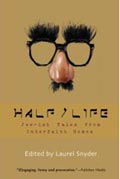Oh jeez. Again, I had a million things running through my head today and this evening, but I've forgotten nearly all of them. Oh, life recorder, where art thou?
Went to see Waking Life with James today. It doesn't have much of a story, just a lot of people spouting armchair philosophy, the kind of stuff most of us talk about from time to time, but expressed relatively well. Most of it is the kind of stuff that seems really interesting to me at first, but then when you stop and think about it, it starts to seem more and more obvious, and often cliché. Interesting questions on the one hand, and completely uninteresting on the other. James and I partially talked about some of it afterwards, but it;s probably best that we didn't have a full blown discussion. We'd already had a talk about the future of technology on the train, and there's only so many of those I can take in a day. Especially a Sunday. I found myselt alternately bored and interested during the movie, certainly I haven't seen that many people walk out of a movie before the end since King Ralph. It had some good moments, but in the end I think most of the questions being explored are in some way meaningless. Sure, we could all be in a dream, but who cares? We are nothing, dreams are nothing, movies less. It's not bad, but it's incidental, not integral.
It's like the secret to good nicknames (SixGig) and band names, also captured by The Simpsons so well in the B-harps episode: Something that is funny (or compelling, in the case of the ideas in the movie) the first time you hear it, but gets less and less funny each subsequent time. That's how I felt about a lot of the philosophy in the movie; it seems very interesting on the surface, but when you start to scratch at it, you quickly realize there's not much to it. See? A perfect reprisentation of being stoned; you think you've discovered the answers to life's biggest questions, but then you forget what you were talking about 5 minutes later.
One of the thoughts I managed to remember occured while a professor-type character was talking about evolution. He was explaining it as an accelerating force, that it will, and does, accelerate quickly to the point at which we'll see it's results in our lifetimes, where the evolution of machines and people will not be distinguishable, the idea of a "neo-human" who will have none of the concerns that we spend most of our lives dealing with, but will be in control of his environment almost completely. It all sounded reasonable, in a sense, if a bit frightening, but I was struck by how categorically it was argued. Not as a theory, but as a kind of truth. It got me to thinking about the and whether it exists already or is just potential. This again ties to the idea Dave takes from Conversations With God about how all things; all time, all space, all ideas, everything, exist as a single thing, that the stretched out and linear nature of our perception is just that, perception. The reality is that all things are happening, have happened, will happen. There is no distinction except in the point of view of the observer. There's the idea that déjà vu and stuff like that are glimpses beyond the veil so to speak, little holes in the linear curtain.
Anyway, this guy is on about compressed evolution, and I'm thinking that this, and any other prognostication on the details of the future, is so strange to me. James and I have these talks, where he's describing what will happen, with a fairly high degree of inevitability, and I'm always taking the "who's to say" side, to oversimplify it. Theories of the future that are well thought out and rational seem to me like fine examples of possible futures, but it's only a deduction of what could happen. Even if the future does already exist, it can't be deduced. Possibly it can be seen by some people, or by everyone at some times, but I don't think it's subject to human logic. We can construct reasonable chains of events and even go about trying to make them happen, but I don't think we can ever rationally predict broad changes in the human experience, if there have ever been any.
It's like what's his name, that german guy, Werner or whatever, and uncertainty. Even when we try to examine if our predictions have been borne out, we're altering the state of things. The more we look, the less we can see.

